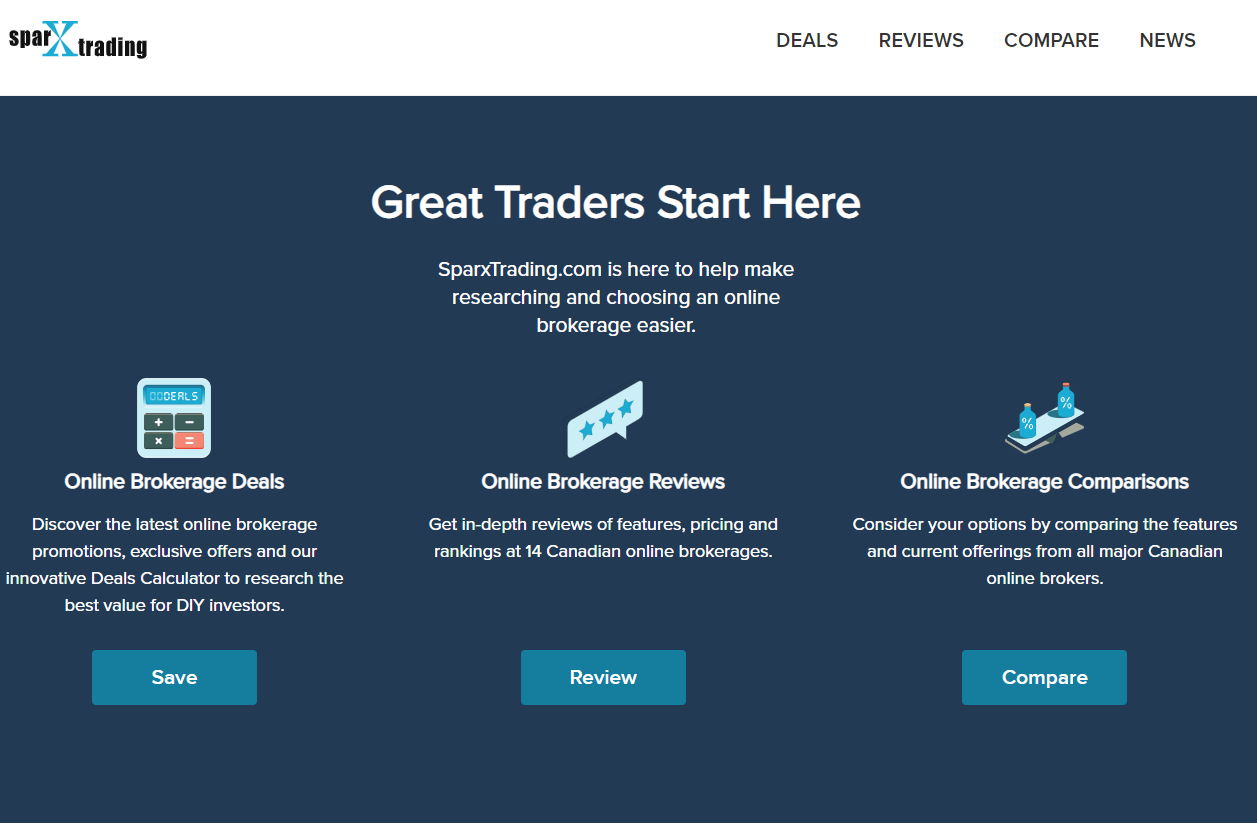Spring has officially arrived. And while the arrival of the new season didn’t fall on a quadruple witching day, in the online brokerage world it nonetheless lived up to its reputation of bringing change, volatility, and the promise of sunnier days ahead.
In this edition of the Roundup, we look at the latest trading commission price drop from a bank-owned online brokerage and the potential consequences it will have for DIY investors and fellow online brokerage competitors. Next, we jump into some interesting deal activity that’s taken place this month, including the launch of a new offer that might trigger even more promotions to start sprouting this spring. As always, we’ve got chatter from DIY investors courtesy of Twitter and the investor forums.
National Bank Direct Brokerage: Commission Price Drop
The days of the $9.95 standard commission pricing for trades at Canadian online brokerages are numbered. How much lower they go from here and how quickly these changes take effect will depend on who among the larger or more popular players decides to act. A recent commission pricing drop by National Bank Direct Brokerage, however, is likely to add significant cause for other Canadian online brokerages, big and small, to revisit their own commission pricing structures.
This month, we noted that the standard equity commission pricing at National Bank Direct Brokerage (NBDB) dropped about 30%, from $9.95 down to $6.95 for all clients. Previously, NBDB charged $9.95 per trade to all clients, but for those clients who were also a client of National Bank – the parent brand to NBDB – a discounted price of $6.95 was available. That restriction is no longer in place, and the $6.95 price is available to all.

Why NBDB chose to lower their commission rate to the $6.95 level and why they decided to do so now are a good indication of how the industry as a whole has approached lowering their commission prices, even in the face of a growing competitive presence in Canada of zero-commission trading and increasing expectations (thanks to Robinhood and other US online brokerages) that trading online should be commission-free. Online brokerages in Canada, for the most part, are taking a measured and stepwise approach to lowering commission pricing, taking cues from competitors as a way to estimate the prices for commission rates that can be supported.
One important driver for National Bank Direct Brokerage is likely competition from its longtime local competitor, Desjardins Online Brokerage.
The drop in standard pricing brings National Bank Direct Brokerage in line with Desjardins Online Brokerage, which lowered the standard commission pricing for the “everyday investor” product, Disnat Classic, to $6.95 in early 2020. While there are still pricing gaps between these two Quebec-focused online brokerages at the very active trader pricing segment, the interesting consequence to National Bank Direct Brokerage enabling all clients to have access to the $6.95 pricing is that National Bank is pursuing an expansion strategy across Canada, implying that NBDB would now also set their sights on other markets outside of Quebec.
The takeaway for the online investing space in Canada is that a much more robust bank-owned online brokerage offering is now available to Canadian DIY investors. Unlike the lower-cost non-bank-owned online brokerages, National Bank Direct Brokerage brings with it many of the features and the convenience of a big five bank-owned online broker. This means that someone looking for the lower cost pricing typically available at an independent online broker but the convenience and perceived security of a larger institution will now have a serious look at NBDB as an online broker. And, once they start looking, there will be some interesting things for investors of all activity levels to find.
For young investors, for example, National Bank Direct Brokerage offers 10 commission-free trades per year and an even lower commission pricing of $4.95 per trade, simply for being 30 years old or younger. No other Canadian bank-owned online brokerage (yet) has this double feature set. Also, the threshold of 30 years old is higher than at several competitors, where the definition of “young” typically ends at age 25 or 26.
Very active traders at National Bank Direct Brokerage also have access to deeply competitive pricing, at $0.95 per trade, and an advanced trading platform, Market-Q. While Desjardins Online Brokerage’s active trader brand, Disnat Direct, does have cheaper pricing, at $0.75 per trade, the reality is that at the sub-dollar-per-trade range, the other factors of banking convenience might come into play.
Lowering commission pricing is something that Canadian online brokerages have seen as inevitable. That said, how quickly the commission pricing drops has shown itself to be highly dependent on who is the one setting the pace.
Despite the existence of a zero-commission provider, for example, there haven’t been any other Canadian online brokerages that have felt compelled to drop their standard commission prices to that level. Instead, we have observed that certain products, such as ETFs, have become the entry point into zero-commission trading, with firms such as Qtrade Investor, Questrade, Scotia iTRADE, and most recently with TD Direct Investing’s Goal Assist. In the category of commission-free ETFs, National Bank Direct Brokerage has also been somewhat of a leader among the bank-owned segment of online brokerages. In 2017, they launched completely commission-free ETF trading – both buying and selling, albeit with minimum purchase requirements.
For NBDB to capitalize on this latest pricing shift, the challenge, it seems, will be to overcome the marketing and advertising hurdle created by the likes of Interactive Brokers, Questrade, TD Direct Investing, and Wealthsimple Trade in markets outside of Quebec. Another online brokerage that has significant market awareness with large markets across Canada is Qtrade Investor, courtesy of their multiple wins and strong finishes in the online brokerage rankings of influential financial research sources. Each of these brokerages commands significant awareness, and, as a result, NBDB has their work cut out for them to start becoming part of the mainstream conversation of online brokerages.
That said, with 14 Canadian online brokerages for National Bank Direct Brokerage to compete against, their pricing immediately makes them worthy of a top-five or -six consideration. When competing against bank-owned online brokerages, however, they could potentially move into the top three.
Undoubtedly, TD Direct Investing would be high on the list of bank-owned competitors, followed, potentially, by BMO InvestorLine in terms of active marketing and advertising. Clearly, by lowering their standard commission rates to $6.95 per trade, National Bank Direct Brokerage has just earned themselves a major advantage relative to their peers. The online broker with the biggest risk of being displaced is CIBC Investor’s Edge, which, up until now, had retained the position of offering the lowest standard commission among the big bank-owned online brokerages.
When we first reported the pricing drop by CIBC Investor’s Edge to $6.95 per trade in 2014, the impact among DIY investors was immediate. Our data showed that DIY investors soon came to see CIBC Investor’s Edge as a value-based option for trade execution. Even so, the pricing structure reflected some of the limitations for active trader experience at Investor’s Edge.
In this case, National Bank Direct Brokerage has pricing for the “passive investor” but also has platforms and pricing for very active investors and young investors. This makes them unique among the “banking” peer group.
Given the propensity of Canadian online brokerages to make smaller moves – especially among the bank-owned online brokerages – we expect that standard commissions might not be the starting point to match the new pricing at National Bank Direct Brokerage. Other places that online brokerages might be able to target to retain clients would be in their definition of “young” investors, which NBDB defines as 30 and under, or with commission-free ETF trading.
National Bank Direct Brokerage’s latest commission pricing move has made them an option that many DIY investors will be hard-pressed to ignore going forward. As a result, it may not be too much longer before the bank-owned online brokerages cannot ignore them either, and yet another wave of commission pricing drops ensues.
So long as the commission-pricing at NBDB stays quiet, the online brokerage industry in Canada won’t have to move quickly. That said, in a day and age of Reddit threads and social media reach, all it might take is one post for that to change.
Deals & Promotions Updates
March is synonymous with spring and with the changes that accompany a new season. While the beginning of the month saw a significant reduction in the number of Canadian online brokerage offers from larger players, we predicted that it would likely not be too much longer before new offers sprouted up again. And, it turns out, we didn’t have to wait that long after all.
This month, we’ve already seen BMO InvestorLine replace an outgoing deal with a new cash-back promotion, and, excitingly, this past week we noted that National Bank Direct Brokerage also launched a new 100-commission-free-transactions offer. More on that in just a moment.
Starting with the BMO InvestorLine cash-back promotion, the new promotion, like its predecessor, is a tiered cash-back offer. The starting deposit tier for the latest offer is higher, however, starting at $25,000, compared to the previous $15,000. Cash-back amounts have also been scaled back significantly at most deposit tiers. Starting tier deposits qualify for a $50 cash-back (compared to $150 the last time), and the highest deposit tier, $1 million and over, still qualifies for a bonus of $2,000.
For National Bank Direct Brokerage, this has been a big month, with newer pricing (see above) and the revival of a 100-commission-free-transactions offer. The new offer provides 100 commission-free trades, which are good for use for up to one year after the account is opened. This new promotion runs until the end of June and is open to new and existing clients so long as the account type is new. Interestingly, the offer applies to trades of stocks and options (and ETFs), which are sometimes not available during certain commission-free trade promotions.
The (re)launch of a commission-free trade offer from National Bank Direct Brokerage, along with their new pricing offer, might prompt other online brokerages to consider coming to market with an offer this spring as well. Interest in investing and trading remains elevated among DIY investors. However, if the thesis that the catalyst for the surge of interest was individuals working from home or putting stimulus money into investing products, then the reopening of the economy (and sports and travel) could lead to decreased interest or availability of individuals to continue actively trading.
Most Canadian online brokerages elect to take a “wait and see” approach to emerging trends rather than risking taking the position as a leader in innovation. With that in mind, deals and promotions offer a proven method to continuously stay on the radar of investors – especially those who might be lured to leave because of dissatisfaction with pricing or service.
What deals and promotions cannot do is solve for technology or service gaps (even though we have seen compensation in the form of trading commissions help smooth out some service shortcomings). So, it is likely – perhaps even sound business strategy – for those online brokerages who are confident in their ability to deliver strong service and technology to lean into promotional offers at a time when other firms are struggling or lagging. As such, a promotional offer could be seen as a sign of confidence and strength in the service delivery model, and an absence of one – at least in the near term – might have DIY investors asking why certain brokerages are choosing to stay out of the spotlight.
Discount Brokerage Tweets of the Week
Discount Brokerage Tweets – Curated tweets by SparxTrading
From the Forums
My Definition Is This
In this post, an investor who is unsure and nervous about how the Canada Revenue Agency defines day trading asks if it’s okay to sell stocks from a TFSA after owning the stocks for just a few days. The CRA doesn’t provide a clear definition, so Redditors weigh in with their opinions.
New Tuber in Town
A new investor asks in this Reddit post if the Canadian Couch Potato method of investing is still relevant in 2021. An in-depth discussion ensues, touching on ETFs, meme stocks, and more.
Into the Close
That’s a wrap on another week. While markets and investing are the focal point of the Roundup, there’s also a human side to this, and this past week was a dark chapter for the AAPI community. Sadly – and, frankly, unacceptably – the level of hate crimes against women and Asians in particular has increased during the pandemic. It is up to all of us to speak up against racist behaviour wherever possible. Here are some steps from Stop AAPI Hate that anyone can take to assist a person experiencing a racist attack or hate crime:
- Take action: Approach the targeted person, introduce yourself, and offer support.
- Actively listen: Ask before taking any actions, and respect the other person’s wishes. Monitor the situation if needed.
- Ignore the attacker: Using your discretion, attempt to calm the situation by using your voice, body language, or distractions.
- Accompany: If the situation escalates, invite the targeted person to join you in leaving the area.
- Offer emotional support: Help the other person by asking how they’re feeling, and assist them in figuring out what they want to do next.



























